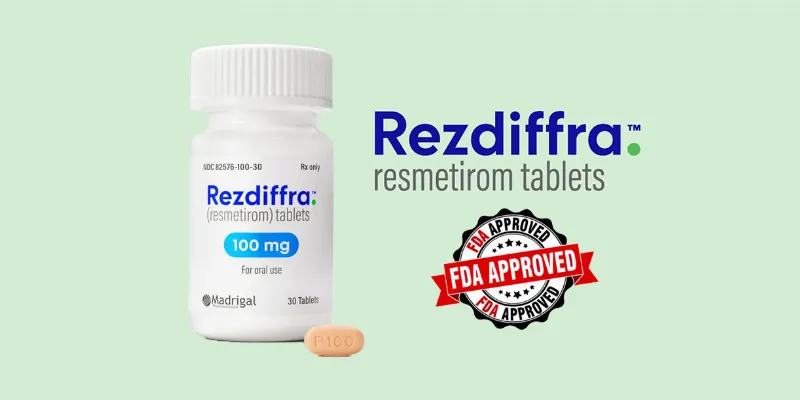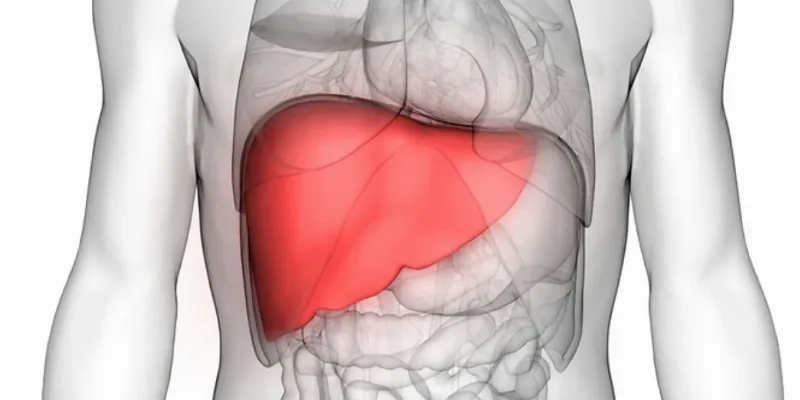A New Era in Liver Disease: FDA Approves First Medication 'Rezdiffra' for NASH

15 March 2024
The FDA has approved Rezdiffra, the first medication for the treatment of nonalcoholic steatohepatitis (NASH), offering hope to millions with liver scarring. Developed by Madrigal Pharmaceuticals, it improves liver fibrosis and resolves NASH in patients with moderate to advanced fibrosis, signaling a significant advancement in liver disease treatment.
Madrigal Pharmaceuticals announced that the US Food and Drug Administration (FDA) has given its nod to Rezdiffra (resmetirom), marking a historic moment as the first approved medication for the treatment of nonalcoholic steatohepatitis (NASH) and liver fibrosis. Rezdiffra not only offers a new therapeutic avenue for individuals with NASH but also symbolizes a pivotal shift in the landscape of liver disease treatment.
This landmark approval is seen as a beacon of hope for millions suffering from this silent but potentially deadly liver condition, closely associated with obesity, type 2 diabetes, and other metabolic disorders. Rezdiffra addresses a long-standing gap in the management of NASH—a condition characterized by liver inflammation due to the accumulation of fat in the liver, leading to scarring or fibrosis. Until now, the condition has affected an estimated 8 million people in the US alone.
“Previously, patients with NASH who also have notable liver scarring did not have a medication that could directly address their liver damage. Today’s approval of Rezdiffra will, for the first time, provide a treatment option for these patients, in addition to diet and exercise” said Dr. Nikolay Nikolov, Director of Immunology and Inflammation in the FDA’s Center for Drug Evaluation and Research.
The FDA's approval of Rezdiffra is based on its efficacy in reducing liver fat accumulation through the activation of a thyroid hormone receptor in the liver. Clinical trials have underscored its potential, with significant improvements in liver fibrosis and resolution of NASH observed among participants.

“NASH with moderate to advanced liver fibrosis is a serious and progressive liver disease that, until now, has not had an FDA-approved therapy. The accelerated approval of Rezdiffra is a culmination of more than 15 years of research from our founder Dr. Becky Taub and a small R&D team that took on one of the biggest challenges in drug development. This is a historic moment for the NASH field and represents the best of what our industry is capable of. We’re excited to deliver Rezdiffra to patients in need,” said Bill Sibold, Chief Executive Officer of Madrigal.
The approval for Rezdiffra following its Phase 3 trial results, which showcased the drug's ability to improve liver fibrosis and resolve NASH in patients without cirrhosis, exhibiting moderate to advanced fibrosis.
Rezdiffra is administered orally once a day, with the dosage tailored to the patient's body weight. The drug's safety profile was thoroughly evaluated in a 54-month randomized, double-blind, placebo-controlled trial, which highlighted its potential in improving liver scarring and resolving NASH, without worsening liver scarring, in a significant proportion of subjects compared to placebo.
This development heralds a new chapter in the fight against liver disease and Madrigal Pharmaceuticals has announced that Rezdiffra will be available in the US starting next month, distributed through a limited specialty pharmacy network.
Despite the promising outcomes, Rezdiffra comes with a note of caution. Its use is advised against in patients with decompensated cirrhosis, and attention is called to potential significant drug interactions, especially with statins used for lowering cholesterol. The most common side effects reported were diarrhea and nausea, which were generally mild to moderate in severity.
About Rezdiffra
What is Rezdiffra, and what is it used for?
Rezdiffra is a medication prescribed for the treatment of nonalcoholic steatohepatitis (NASH) in adults, specifically those with moderate to advanced liver scarring, known as fibrosis, but not cirrhosis. It is used as part of a treatment plan that includes diet and exercise. Its approval for treating NASH and liver fibrosis is based on significant improvements observed in these conditions, with ongoing studies aimed at confirming its clinical benefits further.
- The effectiveness of Rezdiffra for children under 18 years old has not been established, making its safety and efficacy in this population unknown.
- Patients considering Rezdiffra should inform their healthcare provider of any existing liver conditions besides NASH, gallbladder issues including gallstones, and if they are pregnant, planning to become pregnant, or breastfeeding. The potential impact of Rezdiffra on an unborn baby or whether it passes into breast milk remains unknown.
- Interactions between Rezdiffra and other medications can lead to side effects; therefore, patients must disclose all the medications they are taking to their doctors. Particularly, those on gemfibrozil and cyclosporine should avoid Rezdiffra due to increased risks.
What are the side effects of Rezdiffra?
- Possible side effects of Rezdiffra, include liver injury, indicated by symptoms like fatigue, nausea, and jaundice, and gallbladder problems, which might manifest as severe abdominal pain or nausea.
- Common side effects of Rezdiffra, include diarrhea, nausea, itching, abdominal pain, vomiting, dizziness, and constipation.
- Before starting Rezdiffra, it's crucial to have a detailed discussion with a healthcare provider to ensure it's the right treatment option.
Please see the full Prescribing Information, including Patient Information, for Rezdiffra.
Phase 3 MAESTRO-NASH Trial Results
The MAESTRO-NASH Phase 3 trial, involving 1759 patients with biopsy-confirmed NASH, evaluated the efficacy of Rezdiffra in dosages of 80 mg and 100 mg compared to a placebo. Rezdiffra met its primary endpoints—NASH resolution without fibrosis worsening and fibrosis improvement by at least one stage without worsening NAFLD activity score—by week 52, along with a key secondary endpoint of reduced LDL cholesterol at week 24. Notably, Rezdiffra also enhanced liver enzymes, fibrosis biomarkers, and imaging results. Published in the New England Journal of Medicine in February 2024, the trial continues to assess long-term outcomes up to 54 months, aiming to confirm Rezdiffra's clinical benefits for potential full approval.











Comments
No Comments Yet!